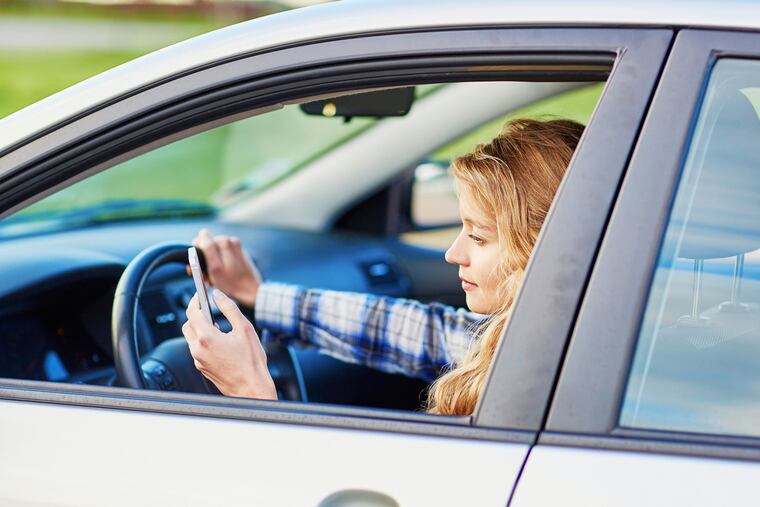Tips to get teens off their devices when they drive
Driving while distracted can make it difficult to react to a potential crash, especially for inexperienced teen drivers. Here's how to talk to you teen about these dangers.

Driving while distracted can make it difficult to react to a potential crash, especially for inexperienced teen drivers. Talking, texting, or using social media while driving takes their eyes and brains off the task of driving.
I recently spoke with my colleague Catherine C. McDonald, PhD, RN, who is conducting studies at Children's Hospital of Philadelphia and Penn School of Nursing to encourage focused driving in teens. What her research shows may be surprising: Even though teens recognize that talking or texting on a cell phone or using social media apps while driving is unsafe, they often engage in these behaviors anyway.
Why the disconnect? It could be due to technology addiction. A survey from Common Sense Media found that half of teens felt addicted to their devices, and 78 percent checked their devices at least hourly. Making matters worse: 72 percent of teens felt pressured to respond immediately to texts, notifications, and social media messaging. Unfortunately, they feel this need even while driving, and teen drivers receive the most calls from their parents, more than general calling patterns would suggest. Parents should provide their teens with safe alternatives to cell phone use while driving instead of being the cause of their distraction:
Complete any call or text before starting the car.
Get directions and try to visualize the destination before turning the key.
Check in with friends or parents only after arrival.
Because technology will change and new distractions will be introduced, parents need to make sure teens understand the value of engaged driving, where the driver is continuously attentive and focused. Here are more tips for parents to help their teen drivers:
Avoid calling while your teen is driving. Ask your teen to call you before leaving one place and after arrival at the next destination. Your teen may feel compelled to answer your call if receiving it while driving.
Discuss this safety concern. Talk with your teen about how distracted driving is especially deadly for newly licensed drivers. Explain that motor vehicle crashes are the leading cause of death for teens in the U.S. and that being distracted from something inside or outside the vehicle can lead to a serious crash. Peer passengers, changing the radio, eating, or applying makeup are all dangerous distractions, along with cell phones – whether hand-held or hands-free.
Set the default "Do not disturb" setting on your teen's phone. With recent upgrades in iOS, Apple created an option to avoid distraction while driving. When the phone detects driving, it sends automated messages and does not alert the driver. Visit this link to learn how to set it up.
Include managing distractions in practice driving. The "TeenDrivingPlan Practice Guide," developed by teen-driving experts at CHOP, includes a lesson on this topic, along with other additional challenges, such as driving at night and in inclement weather.
Model safe behavior. Do not call, text, check Facebook and other social media, or do a Google search while driving, even at stoplights. Let your teen know that you have driven while distracted in the past and that you are changing your behavior to be safe.
Set and enforce house rules. These rules should include no cell phone use while driving and limiting the number of peer passengers your teen may drive. Families can find tips on how to set house rules at TeenDriverSource.org, a website created by teen-driving experts at CHOP.
Know the law. Graduated drivers licensing provisions include restrictions to help prevent distracted driving for newly licensed teens, and research shows most teens do comply with GDL. The provisions include limiting peer passengers and banning texting while driving.
Encourage safe passenger behavior. Your teen should respect the responsibility the friend is taking as driver and not be distracting. Keep the music down. Do not pressure the driver to speed. Do not act wild. Respect the driver by following the rules.
The Teen Driver Safety Research team at CHOP is also testing different interventions aimed at reducing distracted driving, including a web-based educational tool and ways to implement technological solutions, such as automated blocking of cell phone use and silencing of notifications while the vehicle is in motion. These interventions have the potential to help teen drivers manage distractions and stay engaged. We'll keep you posted!